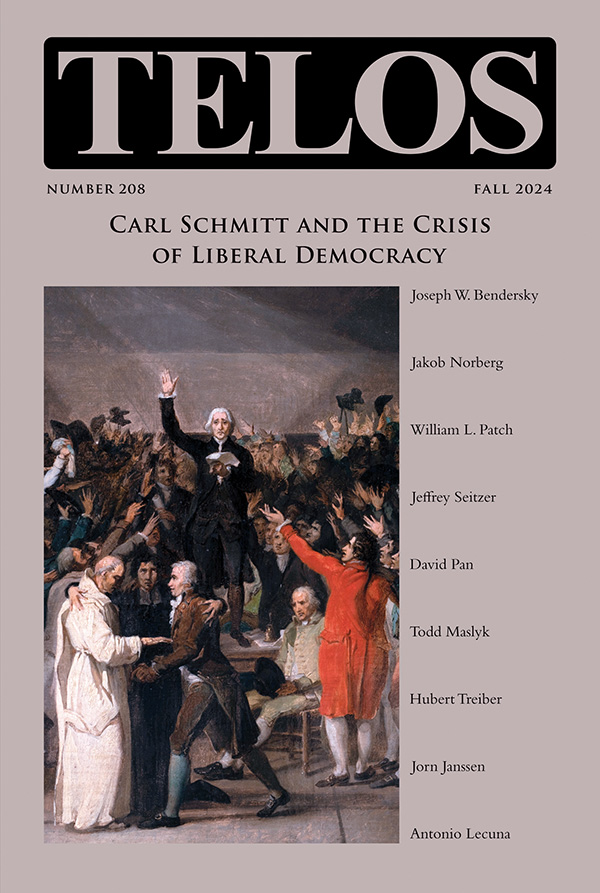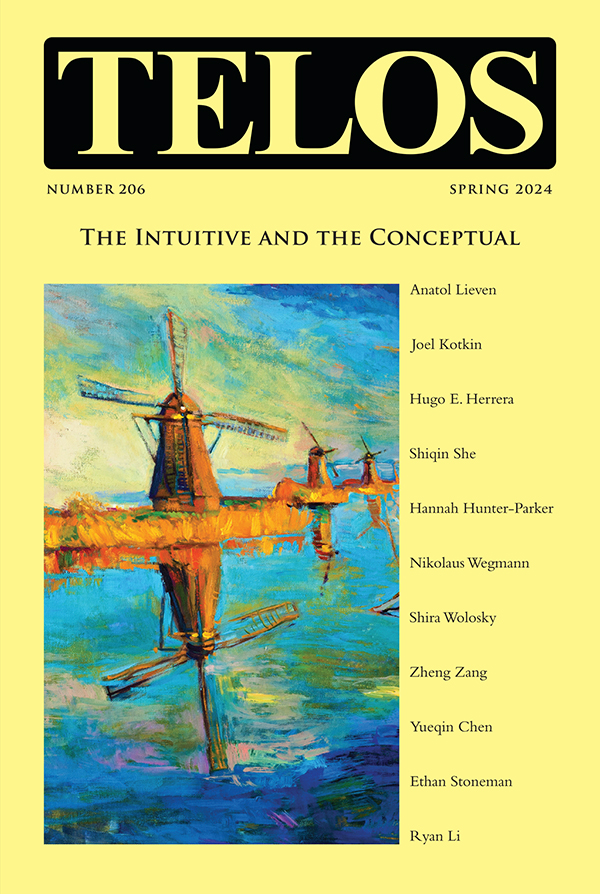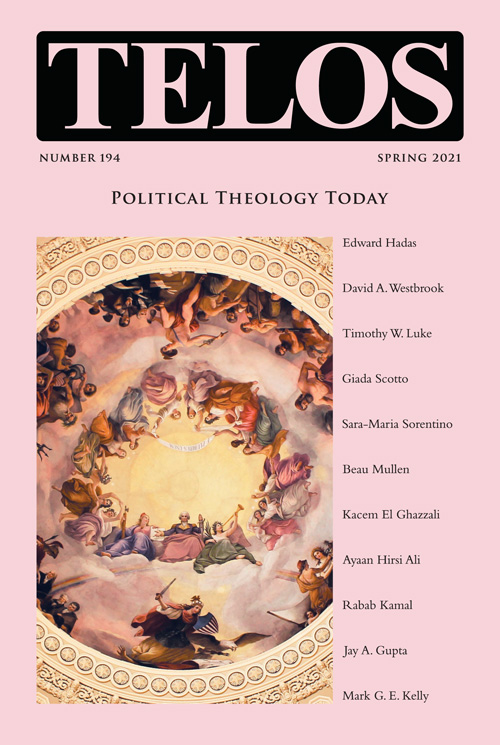By David Pan · Friday, October 18, 2024 Telos 208 (Fall 2024): Carl Schmitt and the Crisis of Liberal Democracy is now available for purchase in our store. Individual subscriptions to Telos are also available in both print and online formats.
 It hardly needs mentioning that liberal democracy is facing a number of threats today, both internal and external. Even if the political parties in the United States cannot agree on the main source of the threats, they both believe that democracy is in danger. Democrats point to the January 6 Capitol riot and Trump’s role in it as examples of the way in which liberal democratic procedures are being directly attacked. Republicans point to the Democratic-backed court cases against Trump as well as the FBI’s favoritism toward Democrats in their public announcements before elections as evidence that the legal system and the administrative state are being used to shut out political opponents. Both parties point to violations of free speech rights at college campuses, yet they also both seek to establish limits to those rights in defense of liberal democratic values. It hardly needs mentioning that liberal democracy is facing a number of threats today, both internal and external. Even if the political parties in the United States cannot agree on the main source of the threats, they both believe that democracy is in danger. Democrats point to the January 6 Capitol riot and Trump’s role in it as examples of the way in which liberal democratic procedures are being directly attacked. Republicans point to the Democratic-backed court cases against Trump as well as the FBI’s favoritism toward Democrats in their public announcements before elections as evidence that the legal system and the administrative state are being used to shut out political opponents. Both parties point to violations of free speech rights at college campuses, yet they also both seek to establish limits to those rights in defense of liberal democratic values.
Meanwhile, authoritarian governments in places such as China, Russia, Iran, and North Korea have becoming increasingly aggressive in opposing liberal democracies as threats to their own legitimacy. In doing so, they have attempted to provide theoretical justifications for their authoritarian rule that are based in anti-Western and anti-colonial discourses that align with critiques of the West advanced by left-leaning academics in liberal democracies.
Because they are based on freedom of expression and freedom of conscience, liberal democracies must allow open public spheres whose dynamics could take unforeseen directions that end up undermining the cultural and procedural foundations of liberal democratic governance. While the American Revolution provides the best example of the success of liberal democracy, the French Revolution and the Weimar Republic demonstrate spectacular failures. Outside of the West, the contrast between Taiwan and China and between Indonesian democracy and the Iranian Revolution indicate that we can find the same contrasts between failure and success in East Asia and in the Islamic world.
Continue reading →
By David Pan · Friday, April 5, 2024 Telos 206 (Spring 2024): The Intuitive and the Conceptual is now available for purchase in our store. Individual subscriptions to Telos are also available in both print and online formats.
 We often have the experience of intuiting something without being able to precisely define what that intuition is. Sometimes this intuition leads to a more well-defined insight, and sometimes it might lead to some kind of action, even in the absence of clear conceptual definitions. Yet it is difficult to ascertain what kind of knowledge or awareness such intuitions consist of. What is an intuition as opposed to a defined concept of something? How seriously should we take such intuitions? Are they something separate and qualitatively different than concepts? Are they just fuzzy concepts? Do they really exist at all? These are crucial questions because they lead to conclusions about the status of concepts themselves. If the alternative to clear concepts is nothing at all, then the sociopolitical corollary would be that the alternative to conceptual knowledge and the holders of such knowledge would also be nothing at all. By contrast, if intuitions are separate from concepts and real, then expert knowledge might possibly have some deficiencies in comparison with intuitions. The essays in this issue of Telos explore in one way or another this question of the status of conceptual knowledge as opposed to intuitive awareness. We often have the experience of intuiting something without being able to precisely define what that intuition is. Sometimes this intuition leads to a more well-defined insight, and sometimes it might lead to some kind of action, even in the absence of clear conceptual definitions. Yet it is difficult to ascertain what kind of knowledge or awareness such intuitions consist of. What is an intuition as opposed to a defined concept of something? How seriously should we take such intuitions? Are they something separate and qualitatively different than concepts? Are they just fuzzy concepts? Do they really exist at all? These are crucial questions because they lead to conclusions about the status of concepts themselves. If the alternative to clear concepts is nothing at all, then the sociopolitical corollary would be that the alternative to conceptual knowledge and the holders of such knowledge would also be nothing at all. By contrast, if intuitions are separate from concepts and real, then expert knowledge might possibly have some deficiencies in comparison with intuitions. The essays in this issue of Telos explore in one way or another this question of the status of conceptual knowledge as opposed to intuitive awareness.
Continue reading →
By Telos Press · Tuesday, April 25, 2023 In today’s episode of the Telos Press Podcast, David Pan talks with John Milbank about his article “A Tale of Two Monsters and Four Elements: Variations of Carl Schmitt and the Current Global Crisis,” from Telos 201 (Winter 2022). An excerpt of the article appears here. In their conversation they discuss the three idioms into which Milbank divides Carl Schmitt’s thought; why they should be seen as separate idioms rather than different aspects of a single perspective; the extent of overlap between the idioms; whether the decisionist Schmitt is as arbitrary as he is made out to be; the characteristics of a medieval European conception of nomos that Schmitt wishes to retrieve; the similarities between Schmitt’s third idiom of global regions and both Nazism and Russian theorists like Gumilev, Panarin, and Dugin; Schmitt’s decisionism, basic values, identity, and thinking through popular sovereignty. If your university has an online subscription to Telos, you can read the full article at the Telos Online website. For non-subscribers, learn how your university can begin a subscription to Telos at our library recommendation page. Print copies of Telos 201 are available for purchase in our online store.
Continue reading →
By Telos Press · Monday, July 4, 2022 In today’s episode of the Telos Press Podcast, David Pan talks with Courtney Hodrick about her article “From Neoreaction to Alt-Right: A Schmittian Perspective,” from Telos 198 (Spring 2022). An excerpt of the article appears here. In their conversation they discuss Carl Schmitt’s understanding of the relationship between liberalism and democracy, and how the separation of the two from each other leads to two versions of extreme right thinking; the general outlines of Mencius Moldbug’s rejection of politics in favor of markets and the relationship between this approach and Schmitt’s understanding of politics as based in the friend/enemy distinction; why Moldbug is an example of what Schmitt defines as liberal; how Moldbug’s ideas contrast with those of Richard Spencer and the extent to which Spencer is a Schmittian; and Curtis Yarvin’s recent shift away from his previous rejections of nationalism and whether this shift represents a merging of neoreaction with alt-right populism. If your university has an online subscription to Telos, you can read the full article at the Telos Online website. For non-subscribers, learn how your university can begin a subscription to Telos at our library recommendation page. Print copies of Telos 198 are available for purchase in our online store.
Continue reading →
By David Pan · Friday, March 19, 2021 Telos 194 (Spring 2021): Political Theology Today is now available for purchase in our store. Individual subscriptions to Telos are also available in both print and online formats.
 What does political theology mean today? At the Telos-Paul Piccone Institute conference from which many of the essays in this issue originated, a primary goal was to discuss the crisis of secular liberalism and “how faith is reshaping culture and politics today.” But even this project perhaps limits too much the scope of political theology, implying that we have a choice between reason and faith, or that political theology is a commitment to faith rather than an analysis of the element of faith that underlies all of our endeavors. The idea of political theology begins with the premise that every existing human order is built upon some understanding of ultimate meaning. The task would then be to analyze the kind of meaning that each existing order embodies and determine the kinds of decisions about meaning that are made and need to be made at various points in its history. Even secular liberalism, to the extent that it constitutes an existing order, presumes some answer to this question of meaning, and a closer look at the political theology of the United States reveals a mythic dimension that underlies its liberal democratic processes. The essays in this issue examine the political theological underpinnings of economy, politics, technology, and religion, laying out the ways in which these areas of human life develop not as autonomous spheres but as the result of struggles over a set of political theological choices. What does political theology mean today? At the Telos-Paul Piccone Institute conference from which many of the essays in this issue originated, a primary goal was to discuss the crisis of secular liberalism and “how faith is reshaping culture and politics today.” But even this project perhaps limits too much the scope of political theology, implying that we have a choice between reason and faith, or that political theology is a commitment to faith rather than an analysis of the element of faith that underlies all of our endeavors. The idea of political theology begins with the premise that every existing human order is built upon some understanding of ultimate meaning. The task would then be to analyze the kind of meaning that each existing order embodies and determine the kinds of decisions about meaning that are made and need to be made at various points in its history. Even secular liberalism, to the extent that it constitutes an existing order, presumes some answer to this question of meaning, and a closer look at the political theology of the United States reveals a mythic dimension that underlies its liberal democratic processes. The essays in this issue examine the political theological underpinnings of economy, politics, technology, and religion, laying out the ways in which these areas of human life develop not as autonomous spheres but as the result of struggles over a set of political theological choices.
Continue reading →
By Russell A. Berman · Monday, March 8, 2021 To read more in depth from Telos, subscribe to the journal here.
 A distinctive feature of public debate in Germany involves prominent literary authors, especially novelists, expounding on current political matters in major newspapers. Thomas Brussig’s essay “Risk More Dictatorship,” translated here, belongs to this genre. Known especially for his satire of East Germany, Heroes Like Us, Brussig chose a provocative title that seems to echo and respond to Chancellor Willy Brandt’s appeal more than fifty years ago to “risk more democracy.” Brandt was speaking in 1969 at a pivotal moment in the history of West Germany, indeed of the whole world, in the face of the protests during the previous year; Brussig in contrast appeals for “more dictatorship” in the face of the coronavirus pandemic, which he depicts as a potentially similar turning moment, with an accelerated “learning process,” that calls old certainties into question. These include the “end of history” claim that liberal democracy is inevitable; Brussig suggests that the “impotence” of democracies in the face of the pandemic raises the question as to whether other forms of government might be superior. The Chinese model of dictatorship casts a shadow across the essay. A distinctive feature of public debate in Germany involves prominent literary authors, especially novelists, expounding on current political matters in major newspapers. Thomas Brussig’s essay “Risk More Dictatorship,” translated here, belongs to this genre. Known especially for his satire of East Germany, Heroes Like Us, Brussig chose a provocative title that seems to echo and respond to Chancellor Willy Brandt’s appeal more than fifty years ago to “risk more democracy.” Brandt was speaking in 1969 at a pivotal moment in the history of West Germany, indeed of the whole world, in the face of the protests during the previous year; Brussig in contrast appeals for “more dictatorship” in the face of the coronavirus pandemic, which he depicts as a potentially similar turning moment, with an accelerated “learning process,” that calls old certainties into question. These include the “end of history” claim that liberal democracy is inevitable; Brussig suggests that the “impotence” of democracies in the face of the pandemic raises the question as to whether other forms of government might be superior. The Chinese model of dictatorship casts a shadow across the essay.
Continue reading →
|
|
 It hardly needs mentioning that liberal democracy is facing a number of threats today, both internal and external. Even if the political parties in the United States cannot agree on the main source of the threats, they both believe that democracy is in danger. Democrats point to the January 6 Capitol riot and Trump’s role in it as examples of the way in which liberal democratic procedures are being directly attacked. Republicans point to the Democratic-backed court cases against Trump as well as the FBI’s favoritism toward Democrats in their public announcements before elections as evidence that the legal system and the administrative state are being used to shut out political opponents. Both parties point to violations of free speech rights at college campuses, yet they also both seek to establish limits to those rights in defense of liberal democratic values.
It hardly needs mentioning that liberal democracy is facing a number of threats today, both internal and external. Even if the political parties in the United States cannot agree on the main source of the threats, they both believe that democracy is in danger. Democrats point to the January 6 Capitol riot and Trump’s role in it as examples of the way in which liberal democratic procedures are being directly attacked. Republicans point to the Democratic-backed court cases against Trump as well as the FBI’s favoritism toward Democrats in their public announcements before elections as evidence that the legal system and the administrative state are being used to shut out political opponents. Both parties point to violations of free speech rights at college campuses, yet they also both seek to establish limits to those rights in defense of liberal democratic values. 

 A distinctive feature of public debate in Germany involves prominent literary authors, especially novelists, expounding on current political matters in major newspapers. Thomas Brussig’s essay “Risk More Dictatorship,”
A distinctive feature of public debate in Germany involves prominent literary authors, especially novelists, expounding on current political matters in major newspapers. Thomas Brussig’s essay “Risk More Dictatorship,” 

